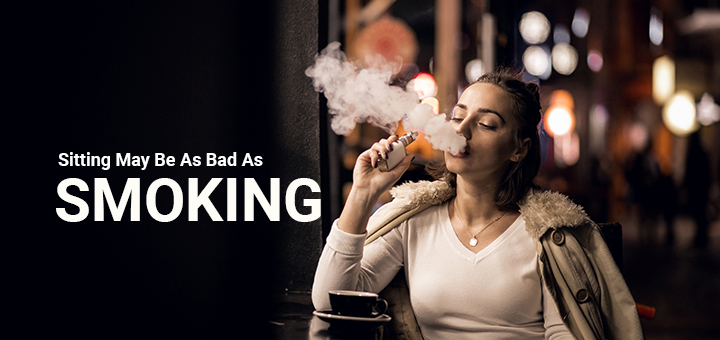Are you sitting at your desk reading this? Maybe you’re reading this while standing at your desk. It seems both, in one way or another, can kill you. Since many of us sit at work dozens of hours a week—we are at risk.
This article was originally published at HVMN.
Why is Smoking Bad For You?
Dr. James Levine of the Mayo Clinic is credited with coining the phrase, “sitting is the new smoking.” In a LA Times interview, he went even further:
Sitting is more dangerous than smoking, kills more people than HIV and is more treacherous than parachuting. We are sitting ourselves to death
But how is sitting comparable to smoking in the first place?
Sitting, Smoking and Your Health
The hype for “sitting is the new smoking” is very real. One study cited 300 news articles mentioning the claim.
25% of adults sit more than eight hours per day, with older adults usually sitting for more time. Even with a sedentary lifestyle, is it fair to compare sitting to smoking?
Let’s be clear about this: sitting isn’t good for you. But the question remains: is it as bad as smoking?
When compared with lower amounts of sitting (less than four hours per day), higher volumes of sitting (greater than eight hours) can have negative outcomes on your health. Generally, health concerns associated with sitting include: cardiovascular disease, all-cause mortality, cancer, and diabetes.

Data shows a strong correlation between sitting for high volumes and diabetes. Sitting can increase the risk of diabetes by 2x. Associations with cardiovascular disease, cancer, and all-cause mortality aren’t as strong but still present. Furthermore, sedentary lifestyles have also been associated with higher risk of depression.
Connection Between Sitting and Smoking
People draw parallels between sitting and smoking because of the results, not the mechanisms of action.
One study showed daily sitting volume and amount of prolonged sitting have been associated with increased mortality (smoking also causes increased mortality). However, a response to the study noted that exactly how sitting negatively impacts health is “unclear and complex.” Some theorize that sitting for extended periods of time and for many hours a day can reduce insulin sensitivity; others believe net calorie expenditures decline too.
Another surprising study showed the association between sitting and cancer; in the study, those with the highest levels of sedentary behavior had significantly increased risks of colon, endometrial and lung cancers. This research also suggested that time spent sitting can be detrimental even to those who are otherwise physically active.

However, the study notes its own limitations: “TV viewing time showed the strongest relationships with colon and endometrial cancer, possibly because…TV watching is often associated with drinking sweetened beverages, and eating junk food.” This underscores the complexities of associating cancer with any one behavior (well, besides smoking cigarettes).
Largely, the connection made by the popular media between sitting and smoking is based on the fact that both might be seen as widespread health risks. Sitting might be a surrogate marker for a much broader social problem: physical inactivity. This physical inactivity absolutely has correlations to some of the health risks associated with smoking, but again, through very different means.
What Do You Do?
Some studies show that even just 30 minutes a day of physical activity can counteract some of the effects of sitting. But the data is extremely mixed. A meta analysis showed that 60 minutes of physical activity a day might reduce some of the effects of sitting.
To view the complete article visit: https://hvmn.com/blog/nutrition/is-sitting-really-the-new-smoking
Sambav makes it a point for its readers to get moving. By increasing physical activity throughout the week (and even moving throughout the day, at your desk), you’ll probably lessen the risks of sitting. Install the Sambav’s Health Wallet App for more interesting features!





